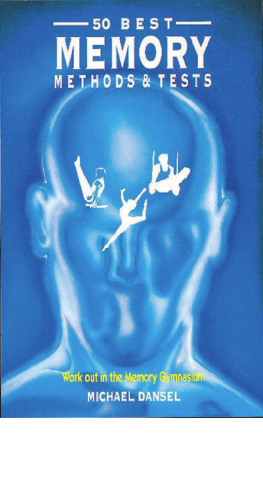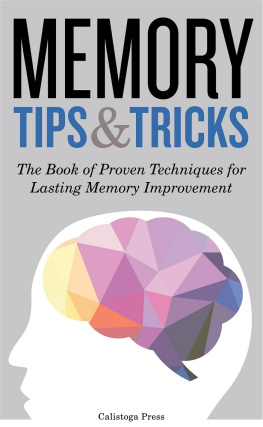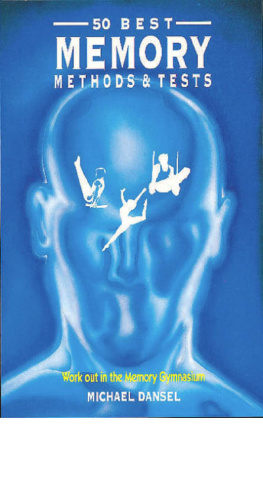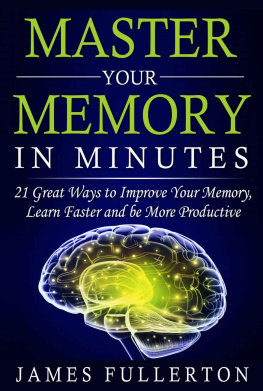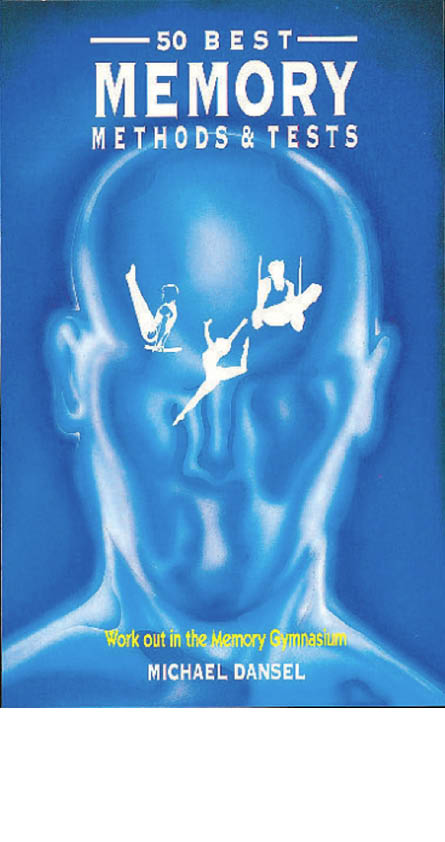First published in Great Britain in 1997 by W. Foulsham & Co. Ltd
Copyright 1997, 2012 W. Foulsham & Co. Ltd
The Copyright Act prohibits (subject to certain very limited exceptions) the making of copies of any copyright work or of a substantial part of such a work, including the making of copies by photocopying or similar process. Written permission to make a copy or copies must therefore normally be obtained from the publisher in advance. It is advisable also to consult the publisher if in any doubt as to the legality of any copyright which is to be undertaken.
W. Foulsham & Co. Ltd
Tricks and Devices
The finest ship in the world never takes to sea without a lifeboat on board. In the same way, the most exceptional and fauldess memory, just like the most luxurious liner, sometimes needs a litde help. Mnemonic methods, those one selects from the vast range that already exist and those that one creates for oneself, are there precisely to be used as a means of recall when faced with a sudden loss of memory.
The temporary mental block that occurs when one is overcome with examination nerves, when one is making a speech or is involved in a debate or, for that matter, in any everyday situation is not something that happens just to others. It is at moments like these that one must have ones life-boat and know how to launch it in time.
In order to retain what one does not want to forget, often the safest way besides a good general knowledge of ones subject is to learn a certain number of tricks or devices.
We have all used devices at school when we were young in order to remember, for example, how to spell certain words. I before E except after C is just one of many that help us spell correcdy when we have a temporary lapse of memory.
Others include Knock off the Y and add IES and the sentence that ensures we spell necessary correctly: Never Eat Cake Eat Smoked Salmon And Remain Young .
In this section there are a range of tests of varying difficulty. However those who have mastery of the areas covered or have the appropriate mnemonic keys will be able to answer the questions without hesitation.
It is really a matter in the form of a game of practising certain mental tricks and thus developing your own personal methods of retaining those facts that you wish to remember.
With most of the tests, there is a table for scores so that you can evaluate your performance.
ONE ANCIENT METHOD
In ancient Greece, when people settled a boundary between two fields, they brought with them a child and gave him a good spanking. The idea was to fix the contract in his mind so that he would be a sort of human land register in case the grown-ups were killed in battle. But we would not advise teachers to adopt such a procedure!
THE LOCI
In ancient times people attached great importance to landmarks in order to memorise a speech. Knowing how to visualise these was believed to be the key to a good memory. Among the Romans, having a good memory was an essential part of rhetoric. An orator had to be able to make long speeches with the greatest precision. And to do that, he had to implant in his mind a series of places ( loci , the plural of locus , is the Latin for places).
So the orator would chose a building or rooms in a house with their various ornaments. Each of these he associated with the various images he needed to recall in his speech. So, for example, if he wanted to talk about liberty, he would mentally place a bird in the square outside or a spear if he wanted to discuss war. To jog his memory, all he had to do was to go through these places in the order of his discourse and in this way he remembered, following a logical progression, the subjects he wanted to cover.
This theory of places was developed by various writers, notably Cicero. And herein lies the origin of the expression in the first place.
NINETEENTH CENTURY LITERATURE
This exercise consists of checking whether you remember English writers of the 19th century. All you have to do is write down the name of ten writers, poets or philosophers of this great period on an answer paper. The object is not particularly to test your literary knowledge. It is in no way a question of culture in the strict sense of the term, but more a way of measuring your ability to recall names that you know but which are perhaps buried deep in your memory.
Even if you are not necessarily familiar with their works, you will inevitably have come across the names of these people in one context or another. In order to come up with many more that ten, you would probably have to delve deep into your store of knowledge.
If the names do not come to mind instandy, then you have lost the key to this store and have no magic formula to help you. If you had, then you would be in a position to fill in the table with the minimum of effort.
You have three minutes to complete the exercise. Score two points for each correct answer. Answers are given on the next page.
Possible answers for evaluation
1. Charlotte Bronte
2. Robert Browning
3. Lord Byron
4. John Keats
5. Thomas Hardy
6. Robert Louis Stevenson
7. Alfred Tennyson
8. William Thackeray
9. William Wordsworth
10. Charles Dickens
MEMORY AND MNEMONIC METHODS
In Greek mythology, Mnemosynis was a Titan, one of the six daughters of Uranus (who personified the Sky) and Gaia (the Earth). She personified Memory (memoria in Latin).
Mnemonic methods are techniques that everyone can use for helping their memory. They consist of converting information into images or of finding a simple formula for retention through analogy or phonetic or visual comparisons.
You invent a relationship or association between something you want to remember and something that is already firmly fixed in your mind, like your date of birth for example.
Answer analysis
- The names given here are, of course, just a selection of 12 possible correct answers. There are many more nineteenth century writers you could have included. If yours are not on the list, check with a reference book before you penalise yourself too hastily with a zero score.
- Those who instandy fill up the ten spaces without resorting to any tricks are rare. They will usually be students of literature or those particularly well-read and acquainted with that particular period. On the other hand, those who could find ten names within the time allowed, without hesitating or having to think too hard, must have had recourse to some mnemonic method.
- Here is a mnemonic device to ensure that you are not taken unawares and find yourself overcome with nerves when faced with an apparendy simple question, but one that could disconcert you in certain circumstances. All you have to do is remember the following sentence: Hardy Bronte lay browning by Ron Keats and Tennys son Thackeray, while Stevens son recited words worthy of Dickens. You will see that all the names in the list appear in the sentence, either in their actual form or phonetically.
A word of advice
Learning this sentence by heart will not, of course, make you an expert in nineteenth century literature. Such a method has its limits. However it can, in addition to enabling you to make a list, enable you to place a writer straight away in his or her correct period.

